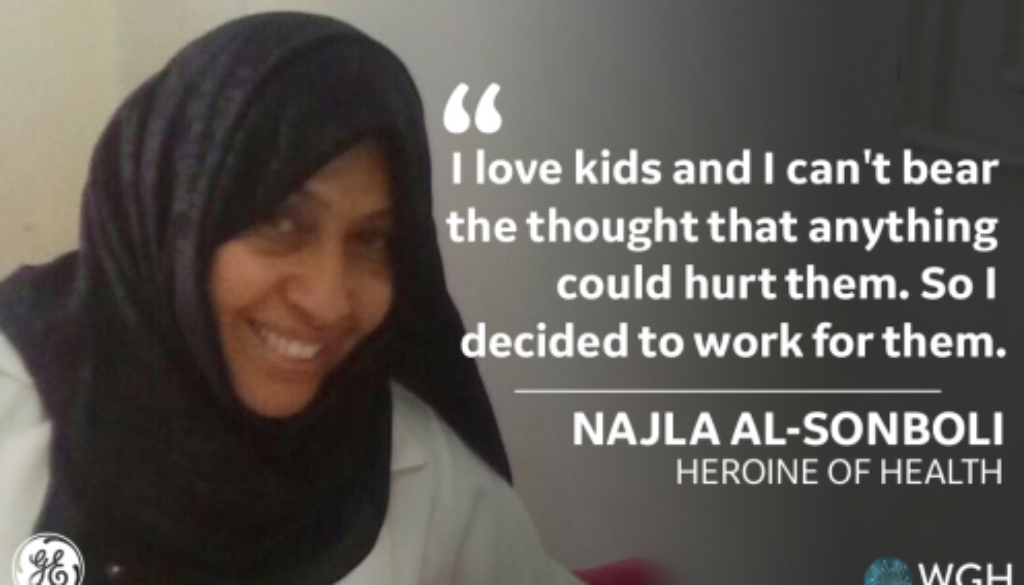Recognising and celebrating women who work on health in fragile and conflict affected contexts
The global health world does not do a good job of celebrating woman leaders. In their excellent Lancet article Rosemary Morgan and colleagues explained that of seven public health and medicine awards from diverse countries, the chances of a woman receiving a prize was nine out of 100 since their inception.
Sally Theobald and Kate Hawkins
Bearing this in mind, Research in Gender and Ethics: Building Stronger Health Systems (RinGs) was proud co-sponsor of the Heroines of Health Awards, held in Geneva during the week of the 71st World Health Assembly on 20th May. Among the many people attending the event was Dr Tedros Adhanom Ghebreyesus, Director-General of the WHO.
In their introduction to the event Women in Global Health and GE Health Care wrote that:
“Women are the future. Today, women make up 75% of the global healthcare workforce and contribute nearly $3 trillion to the industry. But too often their contributions go unpaid and unrecognized – and their stories of impact go untold.”
Through research conducted by the ReBUILD programme and RinGs, we know that woman health workers play critical roles in fragile and conflict affected contexts. The use of qualitative research methods, including life histories, has enabled a rich understanding of the experiences of such health workers, and helped ensure that their voices are heard. And the case studies in the Building Back Better resource have further expanded our knowledge of gender in post-conflict health systems. So, we were particularly pleased that of the nine Heroines of Health honoured this week, four of them were recognised for their work in challenging contexts of conflict or fragility. Their stories are inspiring.
Yemen has endured over 1000 days of war at high cost to civilians and health workers. Professor Najla Al-Sonboli is a leading researcher and Head of Paediatrics at Al-Sabeen Hospital in Sana’a was one of the honourees. Al-Sabeen remains the only centre in Yemen with a functioning Paediatric Intensive Care Unit, at a time when war has brought extreme poverty and hardship to the population of Sana’a, with children particularly vulnerable to new outbreaks of cholera and diphtheria as well as injuries. With her colleagues, Professor Al-Sonboli has worked tirelessly to provide essential care to babies and children at an incredibly difficult time. She said,
“For me, I had the chance to fly out of Yemen as many did but I preferred to stay and help my people. I thought, “if I run away and I am the head of the department, then who will stay? No one will come to work.” So, I decided to go to my hospital under fire and to try to encourage my colleagues to come, too”.
Also honoured was Anne Kinuthia who is the IntraHealth International country representative for South Sudan. She has supported the Ministry of Health and the South Sudan AIDS Commission to develop the necessary guidelines and strategic plan to inform HIV programming in the country. In the interactive panel of honourees, she shared her previous experiences of working in maternal health in the Democratic Republic of Congo, helping women to give birth, amidst rebel fire.
The Dean and the head of research from BRAC James P. Grant School of Public Health in Bangladesh, Professors Sabina Rashid and Malabika Sarker, were honoured for their work or promoting sexual reproductive health and rights within a context of fragility and unpredictability. In 2008, Sabina established a Centre for Gender and Sexual and Reproductive Health and Rights with seed funding from an UN organisation, pushing for evidence-based research, laws to stop child marriage, providing a safe space for LGBTQI communities and working to develop online resources on sensitive topics.
Sadly, war and fragility are not going away, and it is projected that the share of global poor living in fragile and conflict-affected situations will reach 46% by 2030. We need to recognise, honour, support and learn from Najla, Ann, Sabina and Malabika and all the others that work alongside them, in continuing their efforts to bring hope, health and well-being in challenging contexts. These awards reflect the respect and support from the global health community for all that they do.

